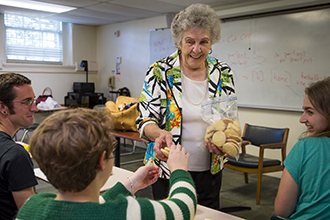French with a Cajun accent

Grandmother Mercedes Plaisance hands out cookies that she baked for students in the Cajun French: Language and Culture course. (Photo by Paula Burch-Celentano)
Wearing white shrimp boots, Mercedes Plaisance, 76, of Cut Off, La., regaled a class of Tulane University students with stories about her childhood growing up in Cajun country. She showed them toys that she played with as a girl a yoyo, dominoes, a ball and jacks, pick-up sticks, a button on a string, a handmade rag doll and a wooden pistol “we used to kill mosquito hawks with a rubber band” as she talked in her native Cajun French with its distinctive lilt, accent, vocabulary and grammar.
Nathan Rabalais, a PhD candidate and instructor in the Department of French and Italian, designed the special projects course called Cajun French: Language and Culture.
“It's mostly a language class, but I obviously incorporated a lot of music, poetry and so forth,” said Rabalais, who grew up in Eunice, La. “The language is a really important part of Louisiana culture; without the language, Louisiana has less and less to distinguish it. People are very aware of Cajun food and music in Louisiana, but the language is not promoted enough.”
Plaisance told stories about her great uncle hiding in a hollow tree so that he wouldn't have to fight in the Civil War battle of Lafourche Crossing, and how German soldiers who were kept as prisoners in a nearby school during World War II helped harvest sugar cane.
Plaisance is the grandmother of Ben Sketchler, a student in the class, who ironically was the only one who had never taken a French course, Rabalais said.
“Memere told me that they had to make up some words to adapt sometimes,” Sketchler said.
In addition to Plaisance, Rabalais arranged for other guest speakers, including musician Bruce Daigrepont and Joseph Dunn, director of CODOFIL (the Council for the Development of French in Louisiana).
Beginning in January, Rabalais has organized an informal reading group called Le Cercle Louisianais to read and discuss Cajun and Creole short stories and poems.
